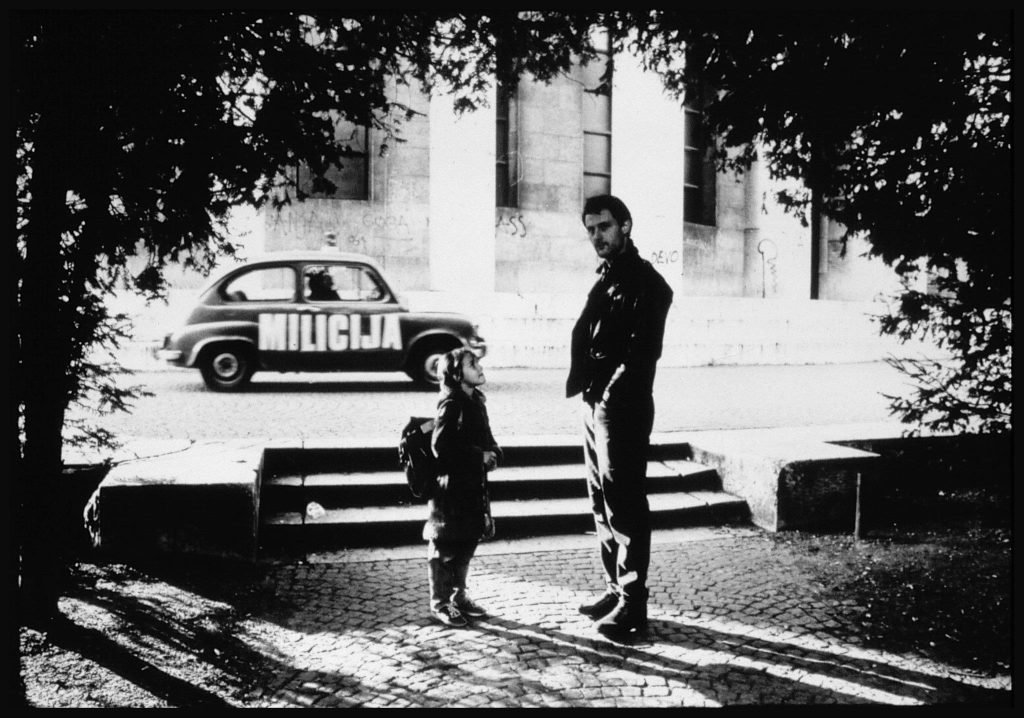Azra’s sophomore album is a monster. Released in 1981 through Jugoton, Sunčana Strana Ulice (“Sunny Side of the Street”) stretches across 24 tracks and a runtime of over an hour. A sprawling, poetic, and politically-charged journey, it remains one of the most iconic releases in Ex-YU rock history. Not just in terms of cult following — this is Rolling Stone Hrvatska’s top Croatian album of all time and third overall, and with good reason.
Unfortunately, due to frontman Branimir “Johnny” Štulić’s strict control over Azra’s material, the album remains painfully difficult to access. No streaming, no reissues, and the vinyl goes for outrageous prices on Discogs. The best you can do is attempt to pick out the tracks from this compilation across several Azra LPs (I might do a little guide on this soon).
Still, when you do hear it, you can understand why it’s discussed in schools. Štulić’s lyrics are cryptic, intelligent, and wholly his own — cut from the same cloth as the band’s namesake, a Heinrich Heine poem (“Der Asra”) from the German Romantic era. There’s a bite and literary edge here that puts most contemporaries to shame.
Despite the overwhelming track count, most songs are short and sharp, like snapshots of different memories, or misadventures through Zagreb alleyways.
We start with a bang here as the opening riff hits like a slap, and Štulić immediately plunges into a world of vice, sweat, and rotten politics. Užas Je Moja Furka (“Horror is my Style”) is hedonistic, angsty, urban — one of the band’s best tracks, for sure.
Next up is Fa Fa Fa, a great example of Azra flirting with ska-punk and two-tone rhythms. Upbeat and infectious, with a rougher edge than your average 2-Tone — more London Calling than The Specials. Pametni I Knjiški Ljudi (”Smart and Bookish People”) offers a similar vibe — these tracks break up the record’s pacing nicely.
Kurvini Sinovi (”Sons of Bitches”) is a sharp-tongued, post-punk anthem about police corruption and societal rot. Controversial on release and still potent today. It’s lean, mean, and full of bile. Similarly, Poljska U Mome Srcu offers Štulić at his most political and poetic. Written in support of Polish workers during the Gdańsk strikes, it’s a rare moment of clear international solidarity in YU rock. The repeated line “Dva puta se ne šalju / Tenkovi na radnike / Tenkovi na nas” (“They won’t send tanks twice / Tanks on workers / Tanks on us”) is chilling — it’s reminiscent of the repeated “Sejmeni dolaze” on Haustor’s Bolero — and the urgency in the instrumentation underlines it. More post-punk perfection.
As we tread forward, we really start to see how versatile this record is. Daleko Od Istine (”Far From The Truth”) is a slower ballad, lush but searing. On the surface, it reads like a breakup song, but the language is so loaded and symbolic that it easily stretches into metaphor — personal or political, possibly both. Gospodar Samoće (“Master of Solitude”) is another dreamlike track about romantic yearning. Azra proves they can do tender and meditative just as well as political and punchy.
Poljubi Me… (“Kiss Me”) is distrustful, cynical, and suspicious — a kiss with a knife behind the back. The band plays with quiet-loud dynamics here, evoking something closer to grunge before grunge was even a thing. There’s a certain proto-Krist Novoselic bass tone that makes the Nirvana comparisons feel legit. And we already know he was in Croatia at the time of Azra and Parni Valjak… 😉
The penultimate track, Nedelja Popodne (”Sunday Afternoon”), is lonely, slow, and bluesy. If the rest of the album is out in the streets, this one’s trapped in a dusty flat, staring out of the window. There’s a saxophone (I think?) buried in the mix that adds a soft, melancholic hue.
A filmic closer — Odlazak U Noć (“Going Out At Night”) is vivid and nocturnal. You can practically see the neon reflection in puddles and hazey smoke-filled bars of Zagreb as the protagonist roams through the city, chasing nightlife and fleeting romance. A great way to close the curtain on a true epic.
Štulić was (and still is) one of the most complicated figures in Ex-YU rock, and this record captures him and his band at full force. Sunčana Strana Ulice is huge. Is it too long? Maybe. Is it fragmented and potentially disjointed at times? Probably. But that’s part of its appeal, and it does a fantastic job at representing a chaotic, poetic, fragmented, and defiant microcosm of ’70s and ’80s Yugoslavia.
It’s hard to think of another album from this region that feels so sprawling yet so precise, so romantic and so revolutionary. For all its rough edges, this one still shines.


